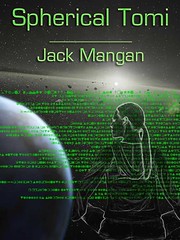OK - we've all wept and worn our black armbands and discussed and discussed the soulless decision from the profit-slave corpoheads at USA/Sci-Fi/NBC networks to cut Sci-Fiction. The bravadoed, "kick-'er-while-she's-down" statements have also surfaced within the SF community in the aftermath of the strike, blasting Sci-Fiction for the quality of its stories as well as the kinds of stories published. Astride these, there have been negative assessments of the whole concept of reading fiction on a computer monitor and of a business model wherein a chunk of tangible money is paid out to writers and the 2 editors, though without advertisement pop-ups or windows or subscription charges, there's no way for such an entity to survive and profit, and therefore it should shut down.
~OK - I didn't like every story (classic or original) in Sci-Fiction, but no market exists where each and every published piece is pure genius. I think Ellen Datlow's Sci-Fiction ratio of good/great to mediocre/poor is outstanding.
~I checked in frequently, but I admit, I didn't read every week. I therefore never saw any stories which I felt didn't belong in a SF pub. I can't comment on that criticism, except to say that I tend to applaud progressive, open-minded thinking. I think SF literature has developed its own sensibility over the years, and therefore a story can exist without any non-existing technologies, magic or mystical events or powers, redefined histories, or any speculaive elements and still hold SF sensibilities, and therefore belong in a SF magazine. Again, I don't know which Sci-Fiction stories incited those readers to complain about the non-SF stories in the mag, so I can't comment on them. However -- in a number of markets, including Sci-Fiction -- I have read published stories of SF-sensibility which pushed the boundaries of the genre. For those, I'll take this opportunity to say "bravo!" to Ms. Datlow and the other brave editors who published them. Incidentally, the opposite model can also apply - where a story full of speculative devices bears no SF sensibilty, and is therefore more easily lumped into the "mainstream" category. Really, this must be on a story-by-story basis, and only if you feel the need to categorize individual pieces of art.
~I *DO* find long readings onscreen to be a chore, to be uncomfortable, but not enough to completely and permanently dismiss the practice. Especially not with the forthcoming technologies that will make e-texts as convenient and portable as pulped trees. And I'd be remiss not to point out that my own readers are obviously coping well with this onscreen reading environment.
~My final point - the point of this post - is a quick and simple refute of this last, short-sighted, "we surrender!" perspective - that it's fair and right that a market like Sci-Fiction should shut down. Capitalism is flawed yes, but it works. Its greatest failure is when we lose ourselves to its laws and forfeit the beauty of our individuality and artistic expression (and empathy and consideration for the less fortunate and poor) to its mechanisms.
Art should be free. Not stolen or Napstered, mind you -- artists deserve to earn money for the time and work and sweat and toil they've put into works of merit and of appreciative audience -- but it should be available for everyone.
Are the magazines that charge money wrong then for doing so? No, of course not. That's a silly debate. There needn't -- shouldn't -- be one model for all art markets. Indeed, various paradigms working side-by-side in healthy competition can only help the field to thrive and thwart stagnance. But no matter the model, to misquote a great SF Hall-of-Famer, "all money should flow toward the authors".
There's a lot more to be said on this -- how historically, great artists were funded by wealthy patrons, or for some mediums or at lower levels, by appreciative public tossing coins into hats. This discussion could lead down any number of paths, but I haven't the time, the inclination, or the space to do so here.
So in summary:
Ellen Datlow: good luck! Find another editorial home soon.
Sci-Fiction: was unjustly cut down and will be long remembered and lamented.
Art: is NOT a product - and the normal rules of profit vs. expense should not apply. Artists ought to be paid for worthy (ie, appreciated) art, but art also ought to be open and available to everyone.


